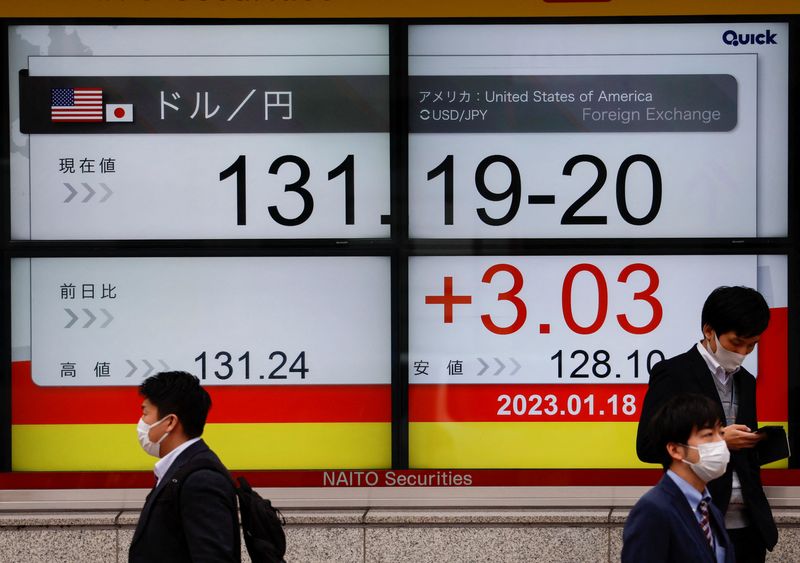(Reuters) -Not too hot and not too cold. That's what investors are hoping for in terms of the economic outlook, as China recovers from COVID and as companies grapple with sticky inflation and increasingly cash-strapped consumers.
But the story three of the world's largest central banks, set to hold their first policy meetings of 2023, tell isn't that of a "Goldilocks" scenario of a gentle slowdown in growth and a gradual easing in inflation.
Here's a look at the week ahead in markets from Kevin Buckland in Tokyo, Dhara Ranasinghe and Naomi Rovnik in London and Ira Iosebashvili and Lewis Krauskopf in New York.
1/WILL THE FED FOLD?
Will the Federal Reserve tone down its hawkish rhetoric in the face of cooling inflation or stick to its guns? Investors widely expect a 25-basis point rate increase at the Feb. 1 meeting and for rates to stop short of hitting 5%.
Fed officials, however, have indicated they expect the key policy rate to top out at 5.00-5.25% this year.
Whatever signals the Fed sends could play an importing role in determining the longevity of the rally so far this year. Dollar bears, meanwhile, will watch for dovish leanings that could further accelerate a decline in the greenback. The currency has tumbled nearly 11% since hitting multi-decade highs last September.
2/ BACK FROM BREAK Chinese markets are back from the week-long Lunar New Year holidays, and will look to pick up where they left off - at a five-month peak for mainland blue chips. The mood should stay bullish after officials said COVID deaths have dropped about 80% from the peak earlier this month, running counter to worries that the New Year travel rush would trigger a fresh wave of infections. Some experts even suggest that the surge in cases after the government abruptly reversed its zero-COVID policies last month has resulted in hyper-speedy herd immunity. The impact of China's Great Reopening may show up in PMIs next Tuesday, with the services sector bouncing back to expansion. Manufacturing is likely still contracting, but that has a lot to do with the timing of the New Year holiday, and next month should see a strong rebound.
3/ YOUR MOVE, ECB
The ECB meets Thursday and is widely tipped to raise rates by 50 bps to 2.5%. Markets care most about what happens next and that's not clear.
Policy hawks are already pushing for more of the same in March. After all, inflation is well above the 2% target as preliminary January data out on Wednesday is likely to show.
Futures price in a further 100 bps worth of tightening between now and July. Amundi reckons ECB rates could reach 4%.
But the doves are getting louder. Yes, inflation is high but it's off record peaks, they say. So, caution is needed before pre-commiting to rate hikes beyond February.
Markets, whipped around by the differing opinions, will be looking for the ECB to speak with one voice. That, at least, is the hope.
4/THE "A" TEAM The three "A's" -- Apple (NASDAQ:AAPL), Amazon (NASDAQ:AMZN) and Alphabet (NASDAQ:GOOGL) - three of the top four U.S. companies by market value - all report earnings on Thursday.
Over 100 companies in the S&P 500 deliver results as the earnings season gets into full swing. Microsoft (NASDAQ:MSFT), the fourth of the U.S. megacaps, has already reported results. Its cloud business hit Wall Street targets, but it delivered a lacklustre forecast that offered little cheer to the broader tech sector. Tech companies generally are under pressure to grow while cutting costs ahead of a potential recession. S&P 500 earnings are set to have fallen 2.9% from the year-ago period, according to Refinitiv IBES data as of Tuesday.
5/THE END MAY BE NIGH
The Bank of England, the first of the major central banks to turn hawkish, is expected to deliver its tenth rate hike since December 2021.
Money markets predict the BoE will raise rates by 0.5 percentage points to 4%. Headline inflation moderated in December to 10.5%, but it's still over five times the Bank's official target.

Deutsche Bank (ETR:DBKGn) analysts say this will be the BoE's final "forceful" hike. Recent data has shown a sharp contraction in UK business activity and lacklustre Christmas retail sales.
Economists polled by Reuters now expect the BoE to stop at 4.25%. But many cited sticky core inflation, which excludes food and energy costs, as the main reason they could be wrong.